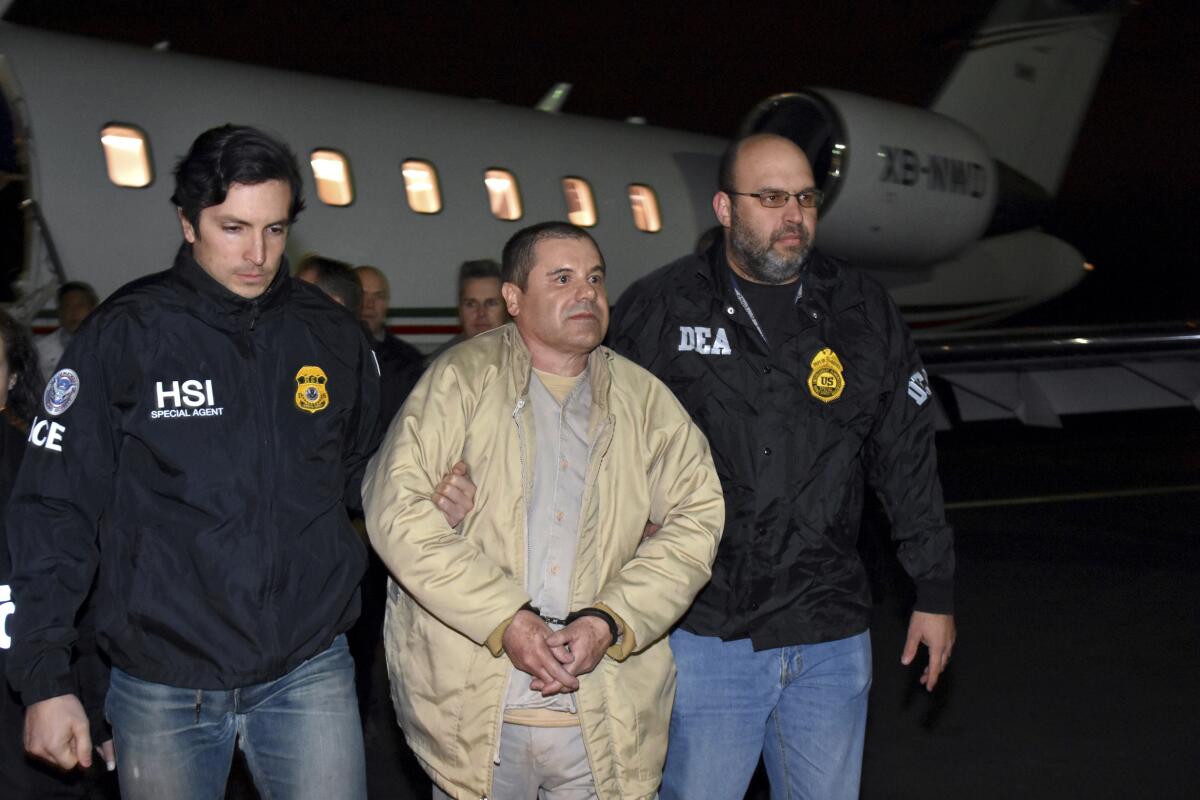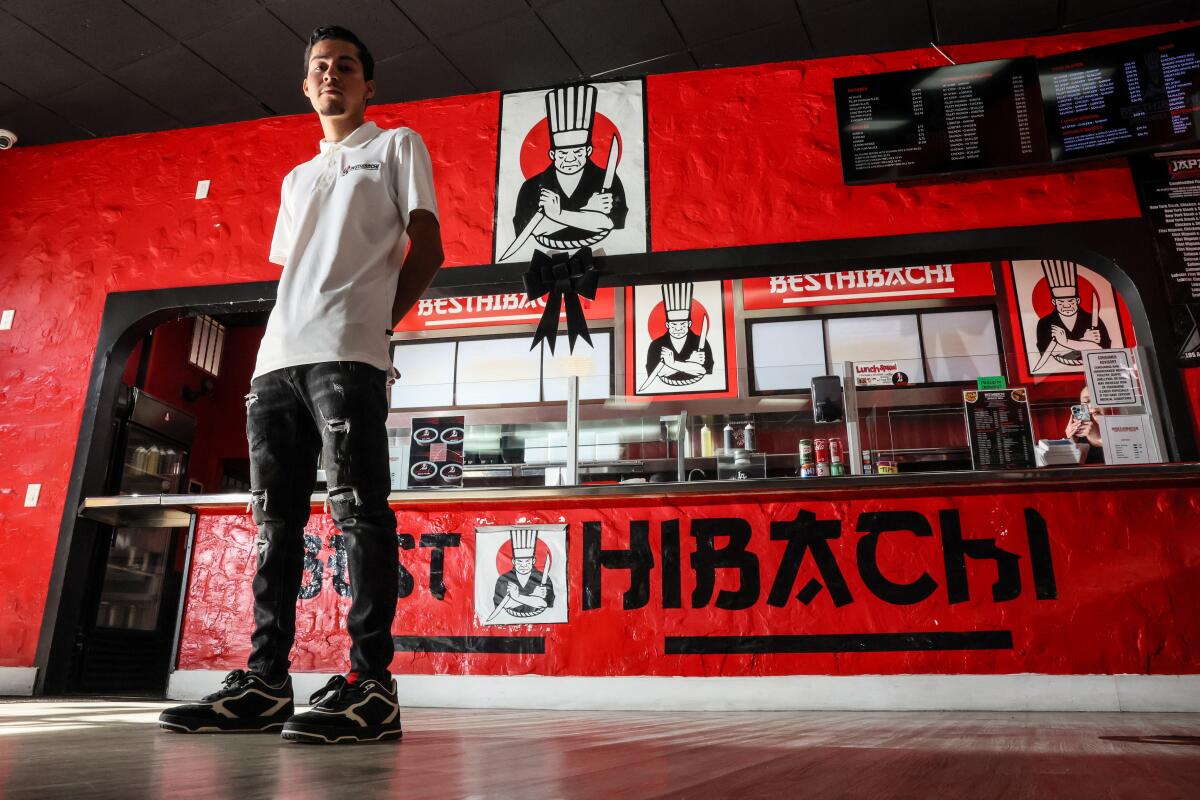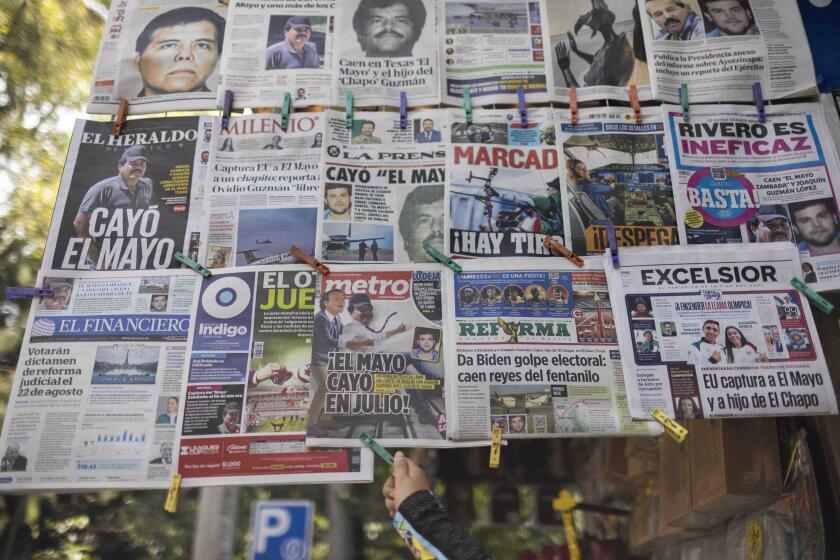Son of ‘El Mago,’ Sinaloa cartel legend killed in L.A., seeks new family legacy

- Eduardo Escobedo Sr., a former drug trafficker for the Sinaloa cartel known as “El Mago,” was shot to death last Thanksgiving in Los Angeles.
- His eldest son, Eddie Escobedo Jr., has since taken over a chain of hibachi restaurants that his father opened after serving time in prison and vowing to quit the narco life.
- As the Sinaloa cartel splinters in Mexico, new details have surfaced about the elder Escobedo’s past, which included working with Joaquín “El Chapo” Guzmán and his son.
Before sheriff’s deputies found his body on Thanksgiving morning last year, shot to death in a desolate stretch of warehouses and pallet yards west of Compton, Eduardo Escobedo Sr. had become rich beyond his dreams.
The impoverished child of East Los Angeles had climbed the ranks of the Sinaloa cartel, the world’s largest drug trafficking empire, working with a son of the infamous Joaquín “El Chapo” Guzmán.
As the cartel’s main cannabis distributor in California, Escobedo earned the nickname “El Mago” — The Magician — for his ability to make bales of it vanish by the ton.
Indicted in 2014 and later sentenced to nearly five years in prison, Escobedo swore to his family he’d left his narco ties in the past. He opened a successful chain of food trucks and hibachi grill restaurants.
But the whispers still followed him: He must be laundering money through his businesses. Selling chopped steak and fried rice couldn’t sustain his lifestyle of Lamborghinis and Richard Mille watches.
After his death at 39, the questions lingered. Was it a cartel hit? Had he cooperated with law enforcement or crossed the wrong man in the drug trade? Or was it a random conflict that escalated into homicide?
In the year following Escobedo’s killing, the Sinaloa cartel splintered in a conflict defined by relationships between fathers and sons. With El Chapo in prison, his sons are trying to wrest control of the cartel from rivals loyal to their father’s old business partner, Ismael “El Mayo” Zambada.
In L.A., Escobedo left behind nine children. The oldest, Eddie Escobedo Jr., says he knows he will always be known first and foremost as “El Mago’s son,” though his dad never wanted his children to follow him into the narco world.

Growing up, Eddie said he knew his father only as a family man who dressed well, drove expensive cars and befriended famous musicians.
Only later did Eddie learn about his father’s meeting in Mexico with the world’s most-wanted kingpin. About the Bentley crashed on the 101 Freeway, the driver slumped over with a bullet in his head. The drunken argument at sunrise that ended in gunfire.
“He wanted money in his pockets,” Eddie said of his father. “He wanted to dress nice. He worked for it. He didn’t just dream about it.”
Eddie was 12 when he got the first idea of his father’s line of work. The family was living in Miami when he walked into the dining room one day and saw what looked like millions of dollars in cash piled on the table.
“I was shocked,” he said.
His father told him to go to his room.
“He never spoke to me about, ‘Hey, I do this,’” Eddie, now 24, said in an interview with The Times. “Never. Never.”
The family traces its roots to Chacala, a small town in the highlands of Durango state. Eddie said his grandmother was eight months pregnant with his father when she crossed the border illegally.
They settled in East L.A. Eddie’s grandmother sewed clothes in a factory; his grandfather was a musician who played accordion and guitar in restaurants. Embarrassed by the family’s poverty, Escobedo ditched school to work at a taco stand, his son said.
Escobedo started selling cannabis as a teenager. According to his son, he earned a reputation for being able to sell whatever his suppliers in Mexico sent him.
Samuel Villalba became a member of the Mexican Mafia in the 1980s. Police found him shot to death in a homeless camp in 2021 and recently arrested one suspected gunman.
“He never stole a dollar. He never burned a bridge,” Eddie said. “All that was recognized by the most powerful people.”
Eddie said that when his father was 20, he traveled to Sinaloa’s capital, Culiacán, to meet the bosses: El Chapo and his eldest son, Iván Archivaldo Guzmán Salazar.

Escobedo and Guzmán Salazar were around the same age and shared an interest in flashy clothing and fast cars. U.S. prosecutors said Escobedo went on to purchase Lamborghinis, a McLaren and a Nissan GTR for Guzmán Salazar.
Now 41, Guzmán Salazar is the reputed leader of Los Chapitos, a cartel faction that formed after his father was captured, extradited to the U.S. and sentenced in 2019 to life in prison.
Los Chapitos are vying with one of Zambada’s sons and allied groups for control of the cartel. The fighting began in late July when Guzmán Salazar’s half-brother allegedly kidnapped Zambada and turned him over to U.S. authorities.
There is growing evidence to suggest Ismael ‘El Mayo’ Zambada was hauled against his will from Mexico to El Paso in an effort by El Chapo’s son to curry favor with U.S. authorities.
Eddie emphasized that he has nothing to do with the cartel conflict. His father left that business years before he was killed, he said.
But there was one episode in Escobedo’s past that “haunted” him, he said.
Two weeks before Christmas in 2008, a singer named Roberto Tapia took the stage at Placita Olvera for a celebration of the Virgin de Guadelupe.
Escobedo had met Tapia on the Los Angeles nightclub circuit, Eddie said. He said his father “opened a lot of doors” for the U.S.-born singer, who was raised in Sinaloa.
“My dad took him to the Louis Vuitton store for the first time,” Eddie said. Tapia wrote a song in Escobedo’s honor called “Gente de Guzman” — Guzman’s people.
Escobedo’s cousin, Andy Medrano, went to see Tapia at Placita Olvera. Escobedo was so close to Medrano he considered him a brother, Eddie said.
Medrano and two friends, Michael Aleman and Chris Medina, were walking back to their cars at 3 a.m. when a silver Bentley Continental GT drove past them, blasting Norteño music, a witness testified.
The alleged assassins behind several recent murder-for-hire cases in Los Angeles were sloppy, authorities say, leaving behind a trail of evidence that links the killings to Chicago gang disputes.
The driver was Jose Macias, 25. Nicknamed “Huerito,” Macias’ father was a high-level marijuana trafficker in the Arellano Felix cartel, according to a police report, which was then the dominant group in Tijuana and a rival of the Sinaloans.
A year apart in age, Macias and Escobedo grew up in the same East L.A. neighborhood, Eddie said.
“They both had the same ambition,” he said. “They were both hustlers.”
They hung out in VIP sections of clubs like El Rodeo in Pico Rivera and El Farallon in Lynwood. Sometimes, after drinking too much Buchanan’s whiskey, their entourages got into fights.
As Macias cruised down Alameda Street, someone shot at his Bentley, according to testimony at the trial of Medrano and Aleman. Both men jumped into Medrano’s Dodge Ram and chased Macias onto the 101 Freeway.
A friend of Medrano and Aleman followed in another car. The friend testified he saw muzzle flashes erupt from the driver’s side of the Ram. Shot in the head, Macias crashed into the center divider.
A young couple targeted four cannabis dispensaries for robberies during a six-week-long spree, prosecutors say. Detectives titled the case file “Romeo and Juliet.”
Some police officers speculated Macias was killed in a struggle over the local drug trade. An informant told a different story, according to a police report: Macias had brought his own band to the festival, which Escobedo considered “disrespectful.”
Los Angeles Police Department detectives arrested Escobedo and questioned him, according to court records. He invoked his right to a lawyer and was let go.
Eddie denied his father ordered Macias’ death. In his telling, it grew out of a clash of personalities between their entourages.
“It was something that easily could have been fixed, but both sides, the egos kicked in,” he said. “It escalated into something that didn’t have to happen.”
Prosecutors offered Escobedo’s cousin a deal: 11 years if he pleaded guilty to manslaughter. According to Eddie, Medrano said, “I didn’t do it. Why the f— would I take it?”
He went to trial and got convicted of murder. A judge sentenced Medrano to 50 years to life.
U.S. Drug Enforcement Administration agents had tapped the phone of Guzmán Salazar in 2013 when they overheard the kingpin’s son talking to Escobedo.
Guzmán Salazar needed help smuggling marijuana through a tunnel — 5.5 tons of it, Asst. U.S. Atty. Adam Braverman said at a bail hearing. Agents arrested a courier working for Escobedo who was transporting 2.7 tons, Braverman said.
Four months later, after hearing the Guzmán Salazar discuss another shipment with Escobedo, agents seized another 1.2 tons from a second courier, the prosecutor said.
The case of ‘El Menchito’ has highlighted the generational divide between boomer-aged drug cartel bosses and their millennial children.
On Aug. 13, 2014, DEA agents arrested Escobedo as he returned to his apartment in downtown Los Angeles. They searched his pockets and found four phones and keys to five cars, a prosecutor wrote in court papers.
Eddie said prosecutors wanted his father to turn on Guzmán Salazar. They could reduce not just his sentence but Medrano’s if he cooperated. “It was a ‘No thank you’ from Andy and my dad,” Eddie said.
When Escobedo pleaded guilty in 2015 to conspiring to distribute marijuana and launder money, he promised his family that he wouldn’t sell another “seed of weed” for the rest of his life, Eddie said.
Released from prison in 2018, Escobedo bought a taco truck and parked it in Pacoima. He soon learned he made next to nothing selling tacos for $2 apiece. His favorite food was hibachi, the chopped steak, chicken, shrimp and lobster served at places like Benihana. He learned to cook the dishes from a friend and renamed the truck “Benihibachi.”

Parked near L.A. Live, the truck took off, Eddie said. His father bought a second truck and parked it next to the first. Then he opened a restaurant on Olympic Boulevard, rebranding as “Besthibachi.”
His third year out of prison, the business reported $12 million in income, Eddie said. Some people whispered that his father must be washing drug money through the hibachi chain.
“Honestly I’d say the same thing if someone gets out of prison and reports those kind of numbers,” he said. But he said the long lines at the trucks – there are now eight of them – and three brick and mortar locations were a “testament” to the legitimacy of his father’s money.
Escobedo once paid musicians to recount his skill at selling marijuana and celebrate his ties to Mexico’s most wanted criminals. But by 2022, the lyrics had changed.
In a song called “El Mago,” the band Edicion Especial sang of Escobedo feeding “gringos” at his Japanese restaurants and said his children were “siempre lo más valioso” — always the most important.
“That’s why they won’t see me fall anymore,” the song goes.
The last night of his life, Escobedo went to Pico Rivera Sports Arena to see Ramón Ayala, a Norteño legend dubbed the “King of the Accordion,” whose music he’d always admired, Eddie said. After the concert, he went to El Farallon in Lynwood.
Nearly 15 years had passed since his and Macias’ entourages had clashed at El Farallon and El Rodeo. Escobedo never grew out of the club scene.
After El Farallon closed for the night, he found an illegal after-hours party. Its organizers had outfitted a warehouse with tables, chairs and couches, according to a coroner’s report. A walk-through metal detector was set up outside the entrance.
The sun had come up by the time an argument broke out between Escobedo and another man, the coroner’s report says.
Eddie said he wasn’t there but spoke to his two brothers who were. They said their father told a drunken man to leave. The drunk got mouthy.
A third man approached them with a gun.
A longtime member of the 18th Street gang, Guillermo “Sad Boy” De Los Angeles had done prison time for trafficking meth and faced charges of extorting protection money from bars in South L.A.
De Los Angeles, 47, was drunk and high on meth when he shot Escobedo 10 times, according to the coroner’s report.
Someone else at the party — the report does not say who — shot De Los Angeles. He died near Escobedo, two bullets in his chest.
Eddie said the Los Angeles County Sheriff’s Department has not told him if they’ve arrested anyone. The detective and lieutenant assigned to the case did not return messages from The Times.
Once again, the rumors flew: It was a targeted killing, ordered by Sinaloa and contracted to De Los Angeles’ gang. Escobedo must have been an informant or returned to the drug business.

Eddie said none of this is true. “As stupid as it sounds,” he said, “it was just a bar argument.”
In the year since his father’s death, Eddie and his brothers have carried on the hibachi business. They plan to expand to other states, perhaps even other countries.
Eddie said he is working on a manuscript about Escobedo that he hopes to publish as a book — and one day a movie. He now knows the parts of his father’s past that he tried to keep from him. He still respects what his father made of his life.
“What he did, he did at the highest level. He sold marijuana at the highest level. He sold hibachi at the highest level,” Eddie said, sitting in the dining area of his family’s restaurant on Olympic Boulevard, steps from Crypto.com Arena.
Eddie has followed the war engulfing Sinaloa. The cartel is undergoing a changing of the guard. The old kingpins are locked up, their sons vying for control. It is a world his father never wanted Eddie to be part of.
Escobedo told his son the profits of the drug business didn’t outweigh what it cost you.
“It’s not something you’d recommend to somebody you love,” Eddie said.
More to Read
Sign up for Essential California
The most important California stories and recommendations in your inbox every morning.
You may occasionally receive promotional content from the Los Angeles Times.















